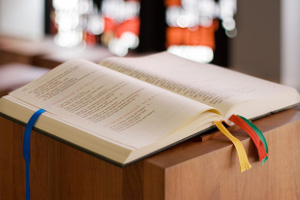 There are two Hebrew words in this reading I would like to draw attention to.
There are two Hebrew words in this reading I would like to draw attention to.
The first is in verse 8 arukah translated as “healing”. This word is about the healing of a wound; properly the new flesh that grows at the wounded spot. It seems as if Isaiah is here drawing attention to this image as he uses a verb “spring up quickly” or “grow” that relates immediately to skin growing back. I wonder: What are the wounds the healing of which we are praying for? And what does new skin on them look like? Isaiah makes a direct connection between this healing and “breaking the yoke” and “feeding the hungry”. I wonder: how can we “loose the bonds of injustice” and “let the oppressed go free”?
The second Hebrew word that caught my attention is in verse 11 kazab translated as “fail”. Literally kazab is “to lie”. This is a spring whose water does not ‘lie’, whose water does not disappoint. I have always interpreted this not only to mean that the spring does not dry up but also that the water is sweet, satisfying and properly quenches desire. This water is like the water in John 4: 14. The prayers we should offer according to Isaiah are: not pointing with the finger, not speaking evil and removing the yoke from among us. How can we do that?
5 February 2017
Isaiah 58: 1-12
This weekly blog on one of the lectionary readings is by Anna-Claar Thomasson-Rosingh, Coordinator for the Centre for Encountering the Bible and Director of Studies for the Centre for Formation in Ministry.

Leave a Reply